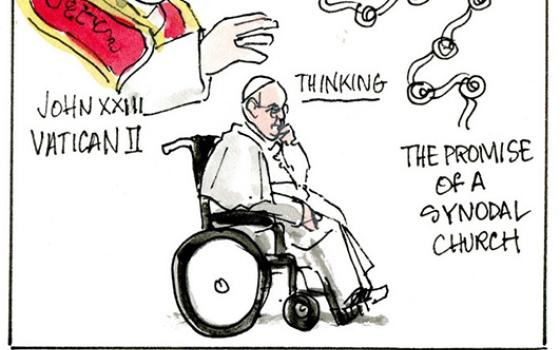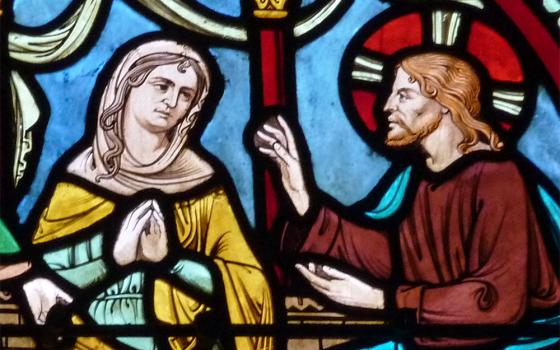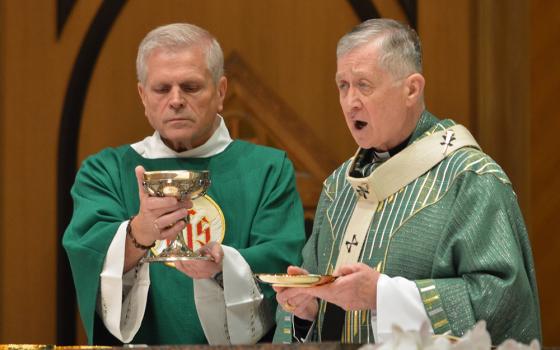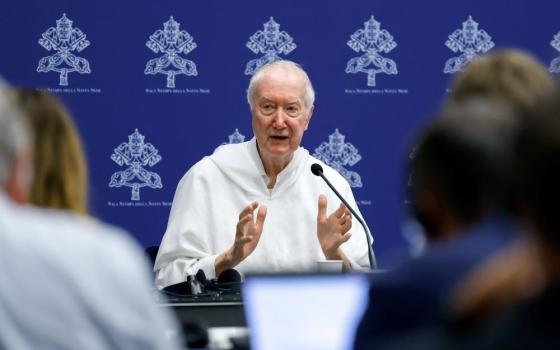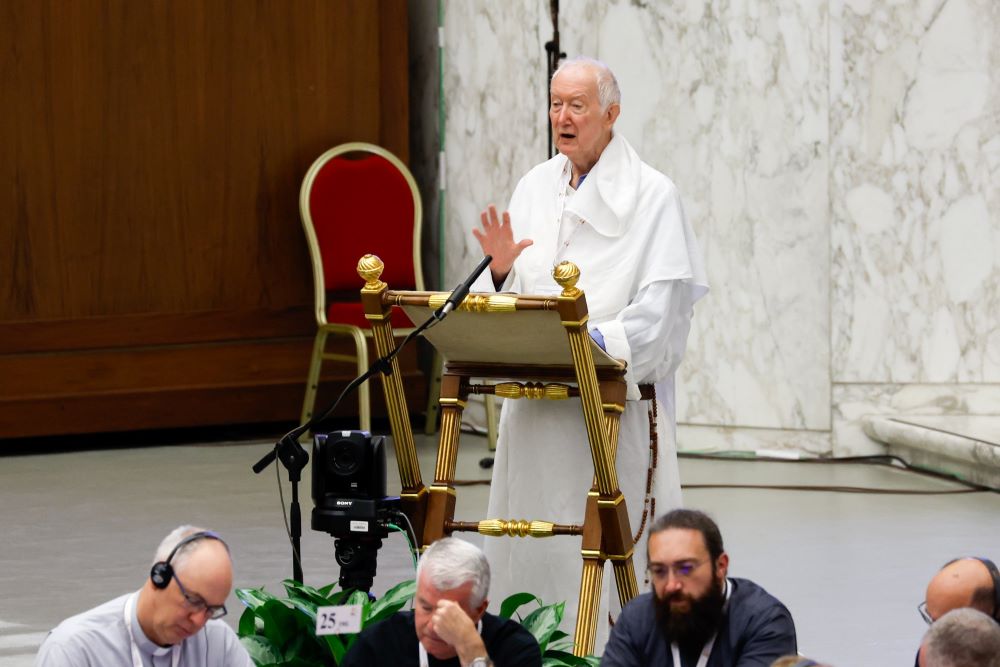
Dominican Fr. Timothy Radcliffe, spiritual adviser to the synod, offers reflections at the assembly of the Synod of Bishops in the Vatican's Paul VI Audience Hall Oct. 18. (CNS/Lola Gomez)
Participants in a closely-watched ongoing Vatican summit heard testimony about a young LGBTQ person who did not feel welcome by Catholic Church officials and committed suicide. And they were encouraged to consider this tragedy when considering how the global church's structures might be made more welcoming.
"Many of us wept when we heard of that young woman who committed suicide because she was bisexual and did not feel welcomed. I wept," Dominican Fr. Timothy Radcliffe told the Synod of Bishops assembly on Oct. 18. "I hope it changed us."
"The Holy Father reminded us 'all are welcomed: todos, todos, todos,' " said Radcliffe, repeating the pope's now often-cited mantra that the Catholic Church is open to "everyone, everyone, everyone."
Radcliffe, a former leader of the global Dominican order who led a three-day retreat for delegates before the start of the Vatican summit, delivered his remarks amid the third week of Pope Francis' Oct. 4-29 synod and at the start of a new section on "Participation, governance and authority."
'The Holy Father reminded us "all are welcomed: todos, todos, todos." '
—Dominican Fr. Timothy Radcliffe
While the synod sessions are generally being held in private, the Vatican is offering a livestream at the beginning of each phase of the discussions, which are termed as "modules." Radcliffe's reflections appear to be in reference to a testimonial shared by one of the synod's more than 450 participants, during one of the assembly's closed-door sessions.
On Oct. 13, NCR reported that during the synod's earlier discussions on the theme of "communion," there were emotional conversations among bishops and lay delegates over whether the church's ministries could be expanded to better include LGBTQ persons.
At the start of the new module on Oct. 18, Luxembourg Cardinal Jean-Claude Hollerich, one of the principal coordinators of the 2023 synod, said that the goal of the synod's current discussions is to consider: "What processes, structures and institutions are there in a missionary synodal church?”
In particular, the Jesuit cardinal said that it is necessary for the synod to examine the church's decision-making processes at all levels.
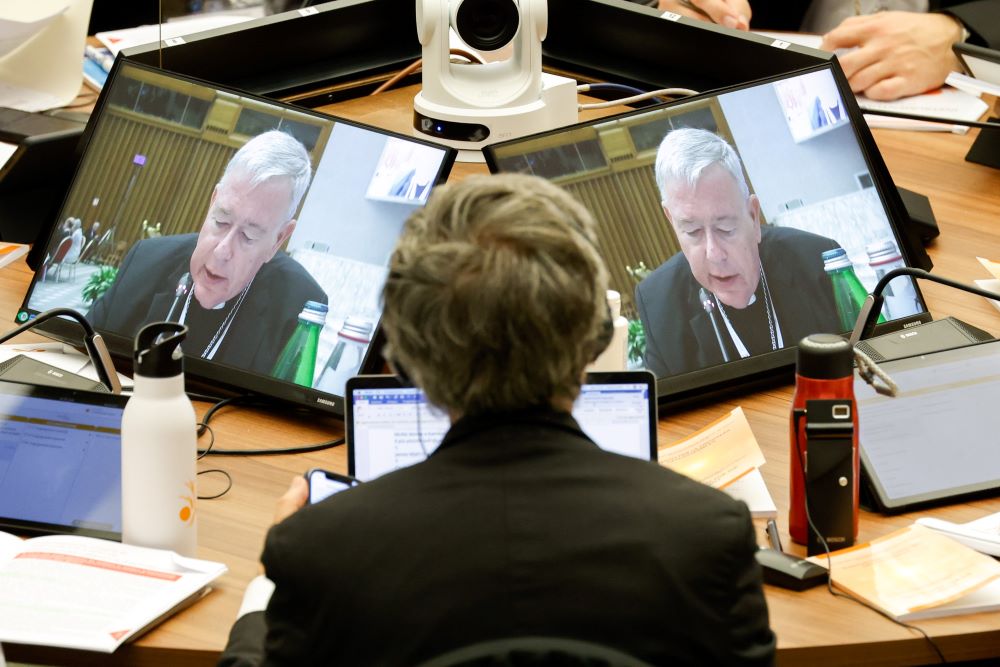
Cardinal Jean-Claude Hollerich, relator general of the synod, is seen on a video screen as he introduces the fourth section of the working document at a session of the assembly of the Synod of Bishops in the Vatican's Paul VI Audience Hall Oct. 18. (CNS/Lola Gomez)
"How can we learn to build a consensus that does not polarize, and at the same time respects the distinctive role of authority, without it becoming isolated from the community?," he asked.
"Where clericalism reigns, there is a church that does not move, a church without mission," he warned. "Clericalism can affect the clergy but also the laity, when they claim to be in charge forever. Clericals, in this sense of the word, only want to maintain the 'status quo', because only the 'status quo' cements their power. Mission, then, impossible!"
While the current synod assembly concludes on Oct. 29, delegates will gather again here in Rome for a second meeting in October 2024 following a year of further consultation within their home dioceses.
A "healthy decentralization" of the church, said Hollerich, will require "small but sensitive changes."
Among changes under consideration during the current synod small group deliberations, he said, are possible future continental ecclesial gatherings, which would include participation and decision-making from among laity and bishops alike.
In addition, the cardinal said that the synod's working groups should evaluate the effectiveness of the newly revamped process for the assembly, which includes lay people as full voting members for the first time.
'Where clericalism reigns, there is a church that does not move, a church without mission.'
— Cardinal Jean-Claude Hollerich
During a Biblical reflection on the theme of participation, Radcliffe said that the history of the church offers endless examples of "institutional creativity" in reconsidering its structures and ministries.
"The new is always an unexpected renewal of the old," he said. "This is why any opposition between tradition and progress is utterly alien to Catholicism."
"Every baptized person is a prophet," he continued. "How do we recognize and embrace the role of prophecy in the church today? What about the prophetic voice of women, still often seen as 'guests in their own house?' "
The task of the synod, he said, is to "lift burdens from the weary shoulders of our brothers and sisters today who often feel ill at ease in the church."
Advertisement
Discussion on the current theme of "participation" will take place through Oct. 23. Previous discussions have focused on the areas of communion and mission.
During the confidential small group conversations, synod delegates are now expected to consider the following questions:
- How can we renew the service of authority and the exercise of responsibility in a missionary synodal church?
- How can we develop discernment practices and decision-making processes in an authentically synodal manner, that respects the protagonism of the Spirit?
- What structures can be developed to strengthen a missionary synodal church?
- How can we give structure to instances of synodality and collegiality that involve groupings of local churches?
- How can the institution of the synod be strengthened so that it is an expression of episcopal collegiality within an all-synodal church?





